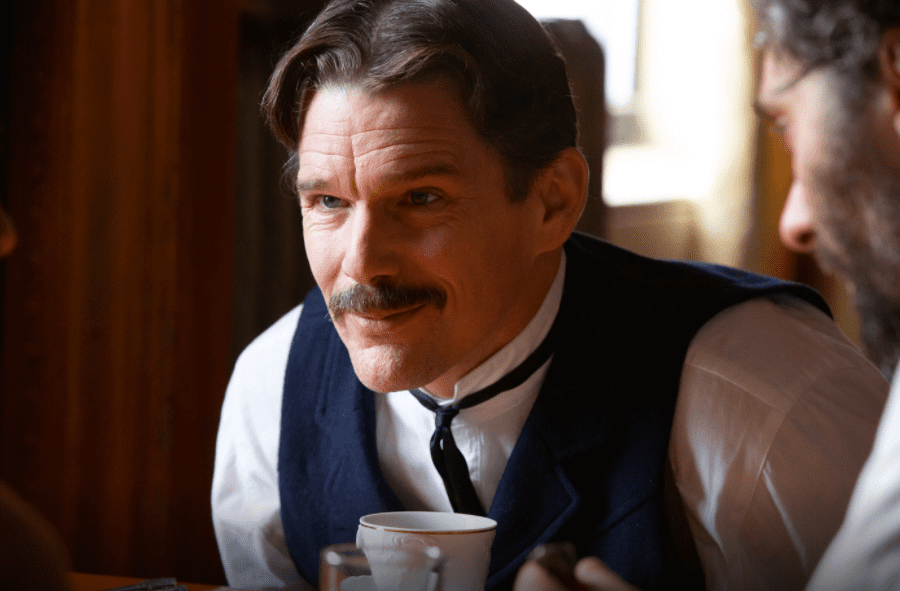
Taking on one of the greatest, most influential, and important inventors in human history, the newest film from IFC Films and writer-director Michael Almereyda, Tesla, attempts to put a unique spin on the life of Nikola Tesla.
Now, Tesla was first described as an “innovate” take on the life of Nikola Tesla (Ethan Hawke), focusing on his time spent obsessively experimenting with electricity and his rivalry with Thomas Edison (Kyle MacLachlan)—which immediately piqued my interest. After watching Dexter Fletcher turn a standard biopic of the life of Elton John into a vibrant, emotional, and fantastical musical with Rocketman last year, the average biopic formula just isn’t enough anymore. So, I was curious to see what Almereyda could bring. Unfortunately, the film ends up being a hit or miss experience.
Overall, the best place to start when talking about Tesla is with the performances, as Hawke and MacLachlan are easily the best aspects of this movie. Hawke plays Tesla as a silent prodigy who has so much going on in his head that he barely has time to speak. Just from looking at Hawke’s face, you can tell Tesla is always working out this idea in his head and it’s funny how easy it is to see him as an important figure since everyone speaks about him like he’s some mythical hero. There’s a great line that Anne Morgan (Eve Hewson) uses to describe Tesla as “a man that doesn’t care about money, but is constantly tortured by it” that’s spot on. Throughout the film, his scientific vision is constantly held back by his struggles to find finances and the support for his “wild visions.” Hawke perfectly depicts Tesla as a man truly out of time here, who’s seen as someone whose vision struggles to stretch beyond the limitation of his time.
As Edison, MacLachlan is the total opposite–rightfully so–as he’s much more social and respected than Tesla is, and it further ignites the silent rivalry between them. In some ways, Edison got everything that Tesla constantly strives for within the film: fame, respect, prominence and glory. He even has the kind of beautiful family that Tesla is never able to achieve and MacLachlan maintains the confidence and arrogance that Edison has throughout his life—even though most of the time he’s a failure. It’s hilarious how Edison even manages to garner all of the failures that Tesla is too afraid to find and it speaks to how he’s always on top of Tesla. MacLachlan heightens all of this with his stellar performance and is an easy scene-stealer whenever he’s on screen.
Through storytelling and style, Almereyda attempts to heighten both Tesla’s persistence for discovery and success as well as his rivalry with Edison. Most of the major life transitions are created using backdrops that are paintings from the time period and it’s probably one of the most effective elements Almereyda uses. Not only do the paintings looks incredible, but they help establish Tesla and Edison as prominent figures as their colorized looks perfectly stand apart against the time. It especially works for Tesla in showing him as someone whose scope and vision make him a fish out of water in that time. However, the rest of the style that Almereyda injects into Tesla doesn’t always pan out.
Honestly, it genuinely comes off like Almereyda was give too much free rein, as there are plenty of stylistic moments throughout the film that lack clear substance and direction. While Hewson does a great job with the narration, there’s no special reason for Anne to be doing the narrating. There are even elements where the characters interact with more modern technology, like laptops and projectors, and even a musical sequence towards the end with Hawke singing “Everybody Wants to Rule the World” by Tears for Fears.
Visually, these scenes are cool and there’s even a really funny moment where Edison and Tesla fight each other with ice cream. However, the substance and intention behind them never comes off clear, so it just creates these constant moments of disconnect that make for an uneven viewing experience. Perhaps these choices are meant to reflect a point that Anne makes towards the end of the film about us currently living in a world that Tesla fantasized about in his head, but it’s a point that feels like conjecture because it’s never made distinctly clear. There’s no real point to the style and it just takes away from the more intriguing substance.
For the most part, Tesla is a strong showing of Tesla’s unflinching determination and aspirations for respect told through the lens of his rivalry with Edison. It’s made even better through Hawke and MacLachlin’s great performances, but misses out on being truly “innovative” because it is unable to give its stylistic choices a sense of purpose. It’s certainly worth watching, but it’s easy to see it as a missed opportunity for something more.

